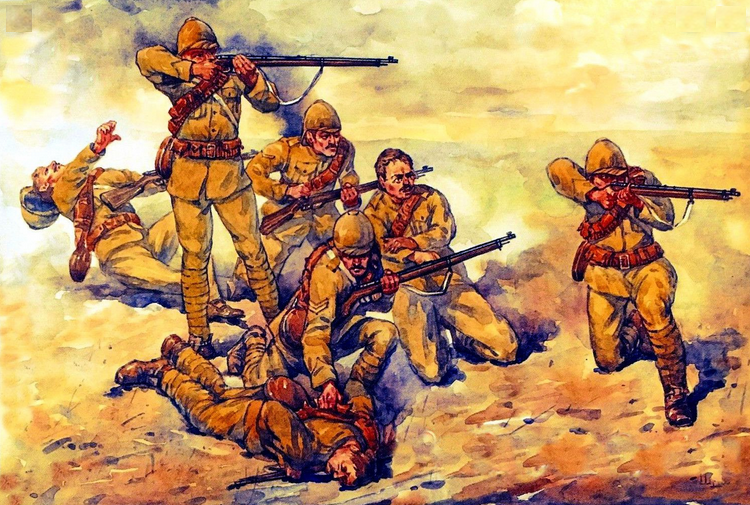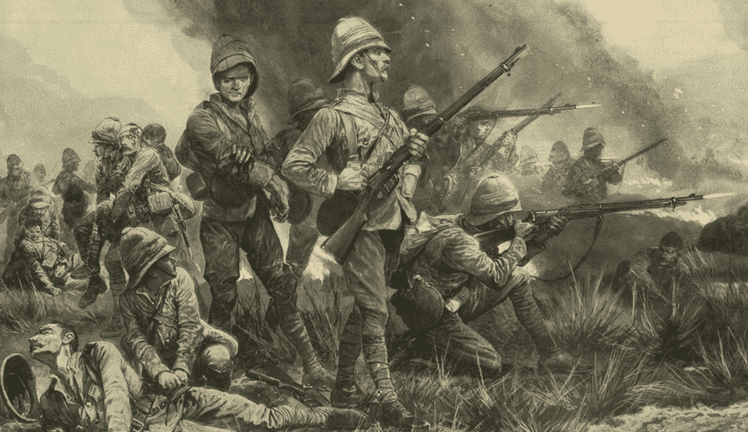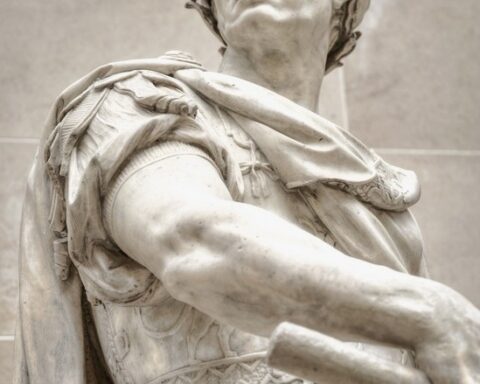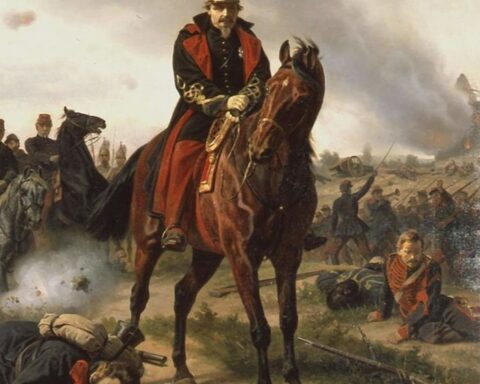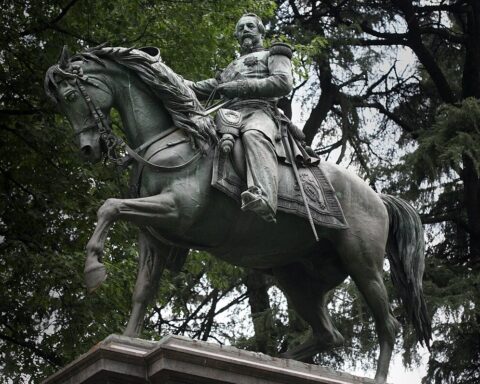Editor’s note: The following classic essay on small unit tactics, by Capt. E. D. Swinton, is extracted from the Journal of the United States Infantry Association, Vol. I, No. 4 (April, 1905). All spelling in the original.
(Continued from Second Dream)
Third Dream
“So when we take tea with a few guns, o’ course you will know what to do—hoo! hoo!”
—Kipling
I was at Duffer’s Drift on a similar sunny afternoon and under precisely similar conditions, except that I now had seven lessons running through my mind.
I at once sent out two patrols, each of one N.C.O. and three men, one to the north and one to the south. They were to visit all neighboring farms and kraals and bring in all able-bodied Dutchmen and boys and male Kaffirs—by persuasion if possible, but by force if necessary. This would prevent the news of our arrival being carried around to any adjacent commandoes, and would also assist to solve the labor question. A small guard was mounted on the top of Waschout Hill as a look-out.
I decided that as the drift could not get up and run away, it was not necessary to take up my post or position quite close to it, especially as such a position would be under close rifle fire from the river bank, to which the approaches were quite concealed, and which gave excellent cover. The very worst place for such a position seemed to be anywhere within the horseshoe bend of the river, as this would allow an enemy practically to surround it. My choice, therefore, fell on a spot to which the ground gently rose from the river bank some 700 to 800 yards south of the drift. Here I arranged to dig a trench roughly facing the front (north) which thus would have about 800 yards clear ground on its front. We started to make a trench about fifty yards long for my fifty men, according to the usual rule.
Some little time after beginning, the patrols came in, having collected three Dutchmen and two boys, and about thirteen Kaffirs. The former, the leader of whom seemed a man of education and some importance, were at first inclined to protest when they were given tools to dig trenches for themselves, showed bundles of “passes,” and talked very big about complaining to the General, and even as to a question in the “House” about our brutality. This momentarily staggered me, as I could not help wondering what might happen to poor B.F. if the member for Upper Tooting should raise the point; but Westminster was far away, and I hardened my heart. Finally they had the humor to see the force of the argument, that it was, after all, necessary, for their own health, as they would otherwise be out in the open veldt, should the post be attacked.
The Kaffirs served as a welcome relief to my men as they got tired. They also dug a separate hole for themselves on one side of and behind our trench, in a small ravine.
By evening we had quite a decent trench dug—the parapet was about two feet six inches thick at the top, and was quite bullet-proof, as I tested it. Our trench was not all in one straight line, but in two portions, broken back at a slight angle, so as to get a more divergent fire [rather cunning of me], though each half was of course as straight as I could get it.
It was astonishing what difficulty I had to get the men to dig in a nice straight line. I was particular as to this point, because I once heard a certain captain severely “told off” at manœuvres by a very senior officer for having his trenches “out of dressing.” No one could tell whether some “brass hat” might not come around and inspect us next day, so it was as well to be prepared for anything.
At dusk the guard on Waschout Hill, for whom a trench had also been dug, was relieved and increased to six men, and after teas and giving out the orders for the next day, we all “turned in” in our trenches. The tents were not pitched, as we were not going to occupy them, and it was no good merely showing up our position. A guard was mounted over our prisoners, or rather “guests,” and furnished one sentry to watch over them.
Before falling asleep I ran over my seven lessons, and it seemed to me I had left nothing undone which could possibly help towards success. We were entrenched, had a good bullet-proof defence, all our rations and ammunition close at hand in the trenches, and water-bottles filled. It was with a contented feeling of having done everything right and of being quite “the little white-haired boy” that I gradually dozed off.
Next morning dawned brightly and uneventfully, and we had about an hour’s work improving details of our trenches before breakfasts were ready. Just as breakfast was over, the sentry on Waschout Hill reported a cloud of dust away to the north, by Regret Table Mountain. This was caused by a large party of men mounted with wheeled transport of some sort. They were most probably the enemy, and seemed to be trekking in all innocence of our presence for the drift.
What a “scoop,” I thought, if they come on quite unsuspecting, and cross the drift in a lump without discerning our position. I shall lie low, let the advanced party go past without a shot, and wait until the main body gets over this side within close range, and then open magazine fire into the thick of them. Yes, it will be just when they reach that broken ant-hill about 400 yards away that I shall give the word “Fire!”
However, it was not to be. After a short time the enemy halted, apparently for consideration. The advanced men seemed to have a consultation, and then gradually approached Incidentamba farm with much caution. Two or three women ran out and waved, whereupon these men galloped up to the farm at once. What passed, of course, we could not tell, but evidently the women gave information as to our arrival and position, because the effect was electrical. The advanced Boers split up into two main parties, one riding towards the river a long way to the east, and another going similarly to the west. One man galloped back with the information obtained to the main body, which became all bustle, and started off with their wagons behind Incidentamba, when they were lost to sight. Of course, they were all well out of range, and as we were quite ready, the only thing to do was to wait till they came out in the open within range, and then to shoot them down.
The minutes seemed to crawl—five, then ten minutes passed with no further sign of the enemy. Suddenly, “Beg pardon, sir; I think I see somethink on top of that kopje on the fur side yonder.” One of the men drew my attention to a few specks which looked like wagons moving about on the flatish shoulder of Incidentamba. Whilst I was focussing my glasses there was a “boom” from the hill, followed by a sharp report and a puff of smoke up in the air quite close by, then the sound as of heavy rain pattering down some two hundred feet in front of the trench, each drop raising its own little cloud of dust. This, of course, called forth the time-honored remarks of “What ho, she bumps!” and “Now we shan’t be long,” which proved only too true. I was aghast—I had quite forgotten the possibility of guns being used against me, though, had I remembered their existence, I do not know with my then knowledge, what difference it would have made to my defensive measures. As there was some little uneasiness among my men, I, quite cheerful in the security of our nice trench with the thick bullet-proof parapet, at once shouted out, “It’s all right, men; keep under cover, and they can’t touch us.” A moment later there was a second boom, the shell whistled over our heads, and the hillside some way behind the trench was spattered with bullets.
By this time we were crouching as close as possible to the parapet, which, though it had seemed only quite a short time before so complete, now suddenly felt most woefully inadequate, with those beastly shells dropping their bullets down from the sky. Another boom. This time the shell burst well, and the whole ground in front of the trench was covered with bullets, one man being hit. At this moment rifle fire began on Waschout Hill, but no bullets came our way. Almost immediately another shot followed which showered bullets all over us; a few more men were hit, whose groans were unpleasant to listen to. Tools were seized, and men began frantically to try and dig themselves deeper into the hard earth, as our trench seemed to give no more protection from the dropping bullets than a saucer would from a storm of rain—but it was too late. We could not sink into the earth fast enough. The Boers had got the range of the trench to a nicety, and the shells burst over us now with a horrible methodic precision. Several men were hit, and there was no reason why the enemy should cease to rain shrapnel over us until we were all killed. As we were absolutely powerless to do anything, I put up the white flag. All I could do was to thank Providence that the enemy had no quick-firing field guns, or, though “we had not been long,” we should have been blotted out before we could have hoisted it.
As soon as the gun-fire ceased, I was greatly surprised to find that no party of Boers came down from their artillery position on Incidentamba to take our surrender, but within three minutes some fifty Boers galloped up from the river bank on the east and the west, and a few more came up from the south round Waschout Hill. The guard on Waschout Hill, which had done a certain amount of damage to the enemy, had two men wounded by rifle fire. Not a single shell had come near them, though they were close to the Kaffir huts, which were plain enough.
____________________________
What an anti-climax the reality had been from the pleasurable anticipations of the early morn, when I had first sighted the Boers.
Of course, the women on the farm had betrayed us, but it was difficult to make out why the Boers had at first halted and begun to be suspicious before they had seen the women at the farm. What could they have discovered? I failed entirely to solve this mystery.
During the day’s trek the following lessons slowly evolved themselves, and were stored in my mind in addition to those already learnt:
8. When collecting the friendly stranger and his sons in order to prevent their taking information to the enemy of your existence and whereabouts, if you are wishful for a “surprise packet,” do not forget also to gather his wife and his daughter, his manservant and his maidservant (who also have tongues), and his ox and his ass (which may possibly serve the enemy). Of course, if they are very numerous or very far off, this is impossible; only do not then hope to surprise the enemy.
9. Do not forget that, if guns are going to be used against you, a shallow trench with a low parapet some way from it is worse than useless, even though the parapet be bullet-proof ten times over. The trench gives the gunners an object to lay on, and gives no protection from shrapnel. Against well-aimed long-range artillery fire it would be better to scatter the defenders in the open, hidden in grass and bushes, or behind stones or ant-hills, than to keep them huddled in such a trench. With your men scattered around you can safely let the enemy fill your trench to the brim with shrapnel bullets.
10. Though to stop a shrapnel bullet much less actual thickness of earth is necessary than to stop a rifle bullet, yet this earth must be in the right place. For protection you must be able to get right close under the cover. As narrow a trench as possible, with the sides and inside of the parapet as steep as they will stand, will give you the best chance. To hollow out the bottom of the trench sides to give extra room will be even better, because the open top of the trench can be kept the less wide. The more like a mere slit the open top of the trench is, the fewer shrapnel bullets will get in. While chewing over these lessons learnt from bitter experience, I had yet another dream.

